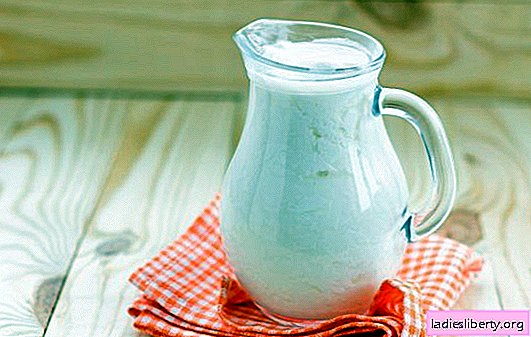
How much milk or artificial formula should a baby eat per day? There is no definite answer to this question. This primarily depends on the infant's appetite, its weight, age, formula for feeding, milk fat content, as well as many other factors that change the diet.
When it comes to breastfeeding, the excitement of young mothers is quite justified, since they have almost no chance to measure the amount of milk consumed by their child. However, the basic principles of motherhood make it quite simple to find out whether a baby receives enough milk or not.
How much milk should a newborn eat in the first days?
In the first days of postnatal life, the baby requires a small amount of milk with 8-12 single feeds. As they grow, the ability to eat milk will grow from 30 ml in the first days, and up to 300 - 360 ml in the first two weeks. By the end of 4 weeks a newborn can eat up to 700-800 ml of mother's milk daily.
Little need for food in the first days of life is associated with the tiny size of a baby’s stomach, which can take only the minimum amount of milk and digest it easier than milk formulas. As it grows, the stomach will grow, the frequency of feedings will decrease from 12 to 7 times, and the amount of milk eaten for one feed will increase in volume.
If your little miracle:
• sleeps well and quietly aktivnichaet in moments of wakefulness;
• correctly gaining weight, grows well and develops;
• requests to eat from 8 to 12 times within 24 hours;
• regularly produces up to 4-6 wet diapers and regularly empty the intestines;
• At the end of feeding, he falls asleep sweetly, looks happy and contented - your child receives the required amount of food.
During the period of intensive growth, the infant will require a larger amount of food. This is happiness for a nursing mother, as frequent requests for feeding stimulate the production of a sufficient amount of milk, promote good growth of the infant, form a safe 3-4 hour interval between meals.
How much does a child eat 1 per month and how to understand what the baby wants to eat
The average milk intake by the month of a baby’s life is approximately 700–1050 ml (150–180) with 6–7 single meals a day. Understanding the needs of the child allows not only to develop the correct regular feeding schedule, but also contributes to the proper growth and good health of the child. Child nutritionists advise feeding an infant only when it is hungry. Moreover, hunger should be determined not by the crying of the child, but by the earlier signals that the child tells the mother:
• turning the baby's head to the right and left;
• frequent opening of the mouth and protrusion of the tongue;
• gestures with arms and legs;
• putting a cam or thumb in your mouth;
• search reflex (moving the mouth in the direction of various stimuli).
Most studies show that babies in the first 6 months do not need anything other than breast milk or optimized formula. Dairy food allows you to delicately form the digestive system, to prepare the body to receive hard food. If a baby eats breast milk for up to 6 months, this helps protect it from many infections and form a strong immunity. Such feeding up to 6 months allows to exclude moments of improper ingestion of food.
Feeding a baby with artificial formula
Feeding an infant with an adapted milk formula provides for a completely different approach to the nutrition process. In general, children as well as babies eat when they are hungry and stop when they are fully fed. But with artificial intake of mixtures, it is important that the child does not overeat and maintain a healthy weight.
Many pediatricians advise parents to correctly calculate the required amount of infant formula for a child. And in this case, the rule known to many is valid: it is better not to feed the baby than to feed. Otherwise, you can earn the pathology of the digestive tract and excess weight.
Calculation of nutrition before the age of 3 months should be calculated according to the body weight of the infant, followed by dividing the indicator by 5. For example, if the child has a mass of 4000 grams. When dividing the weight by 5, we get 800 ml of milk formula per day. If the value is divided into 8 feedings, we get 100 ml of milk formula for 1 feeding.
That is, the question: how much milk should a baby eat per month? Can answer:
During the first month of life, the newborn should eat from 700 to 800 ml of milk formula at 8-12 feedings. Have 16 hours of night and daytime sleep, a small amount of time to play, develop important muscles, work on new skills and interact with parents.
How much does a child eat 2 per month
The formula of artificial feeding for a 2-month-old baby remains approximately the same as for a month-old baby. When feeding it is very important to observe a favorable emotional environment. Mom during feeding needs:
• choose a cozy place and a comfortable position for the child;
• have a calm, benevolent mood;
• pull the baby to him, look him in the eyes, smile, talk;
• select the temperature of the milk mixture close to the parameters of the body - 36-37 degrees.
How many baby eats in 3 months
A 3-month-old baby still receives most of the nutrients from artificial milk formula in the amount of 700-900 grams, but it feeds already 6-7 times a day. He has already turned into a little man who is able to demonstrate his character and habits.
Some pediatricians believe that the period between 3 and 6 months is the ideal time for complementary feeding in babies. Other pediatric pediatricians, on the other hand, claim that by 3 months the infant digestive system is very immature. And although the babies have already learned how to suck the breasts and the baby bottle well, they still cannot produce enough saliva necessary for good digestion of hard foods.
Why do many pediatricians advise parents to postpone the introduction of hard food to 6 months?
Reason 1
In infants 3-4 months, the body produces an insufficient amount of some important digestive enzymes, such as amylase. This enzyme is necessary for the proper digestion of cereals, starch and complex carbons. Up to 6 months, the body of babies is also not able to digest many fats. If it is too early to introduce foods that are high in protein in the infant's diet — chicken eggs, meat, fish, and in some cases whole cow's milk — this can cause serious diseases due to immature kidneys.
Reason 2
In infants less than six months of age, the muscles of the throat are not sufficiently developed to swallow solid food. Toddlers are not sufficiently able to use their language, since the extrusive reflex is not developed in it. If you start feeding a baby with a spoon from 3 months, it will not swallow food correctly, will not be able to spit out food and will not be able to close its mouth in time.
Reason 3
Only by the end of 4-5 months does the child become able to inform parents of sufficient satiety in the movement of the turning head. If you enter the lure with 3-4 months may disrupt the mechanism of self-regulation. This can trigger overweight, childhood obesity, and the development of diabetes.
Reason 4
If a breastfeeding mother practices early feeding, it will affect milk production due to a reduction in his need.
Signs of readiness to receive hard food:
• child's age close to 6 months;
• child's weight is 2 times more than at the moment of birth;
• the child can sit well without the support of adults, can easily lean forward, holds a baby spoon well in his hand;
• the child has good control over the movements of the head, can turn his head when full;
• has a good reflex of swallowing and spitting food;
• eats 8-9 times a day and empties two breasts (when breastfeeding);
• has a short feeding time, often requires additional food;
• is interested in new food and food that parents eat;
• wakes up at night and requires food.
How much should a baby eat 4, 5 and 6 months
According to the standard calculations of children's nutritionists in the period from 4 to 6 months, babies should eat from 800 to 1100 formula per day in the absence of any complementary food. Moreover, the amount of water drunk by infants is not taken into account in the total amount of food.
If the parents actively feed the feed in the child’s diet from 3-4 months of age, the amount of adapted infant formula decreases to 700–400 grams per day, and new foods appear in the infant’s diet such as fruit puree, clarified juice, light curds, egg yolk, vegetable pureed formulations, liquid milk rice, oatmeal, buckwheat or wheat porridge, dairy products - kefir, yogurt.
Mixed infant formula is better to offer the baby in the morning and evening feeding. If the child does not eat up to the end the amount of formula given to him, do not force him to feed him.











